Research Proposal: Infant Teachers and Malay Children's Development
VerifiedAdded on 2023/01/12
|31
|8196
|75
Report
AI Summary
This research proposal investigates the understanding of infant and toddler teachers regarding their interaction with underprivileged Malay children (UPMIT) aged 2-30 months, focusing on brain development. The study addresses the communication gap between educators and UPMIT families, emphasizing the importance of early experiences. The research aims to understand how teachers promote the development of these children, guided by the 'Serve and Return' theory. It includes research questions about teachers' understanding of interaction and their practices. The methodology involves a qualitative approach with a sample of 20-25 teachers, employing inductive reasoning and data analysis techniques to explore the teachers' perspectives and practices in Singapore. The literature review covers early childhood development, the role of educators, and the challenges faced by the Malay community. The expected outcomes aim to provide insights into effective teaching strategies for UPMIT and to contribute to the improvement of early childhood education programs. The study also addresses ethical considerations and limitations.
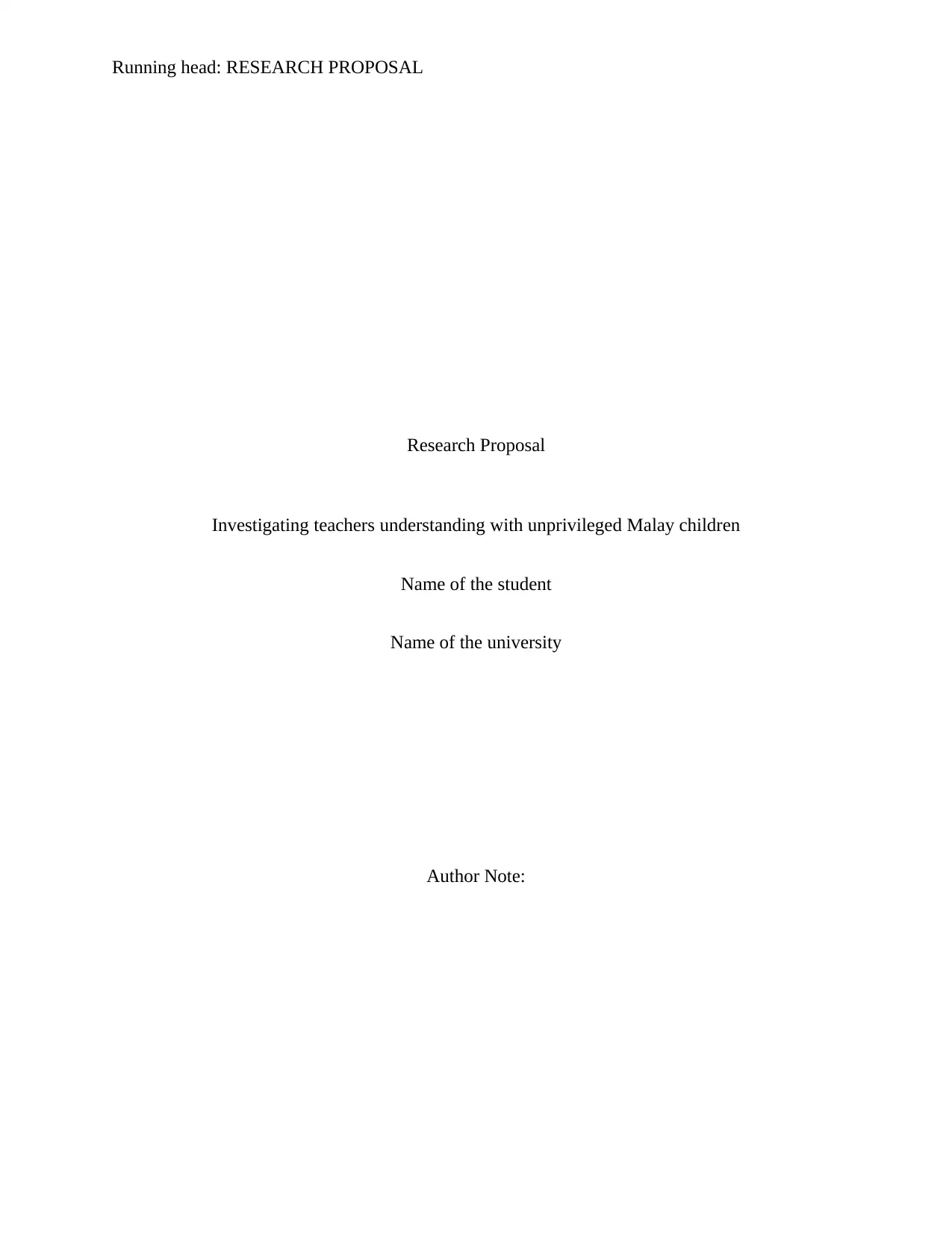
Running head: RESEARCH PROPOSAL
Research Proposal
Investigating teachers understanding with unprivileged Malay children
Name of the student
Name of the university
Author Note:
Research Proposal
Investigating teachers understanding with unprivileged Malay children
Name of the student
Name of the university
Author Note:
Paraphrase This Document
Need a fresh take? Get an instant paraphrase of this document with our AI Paraphraser
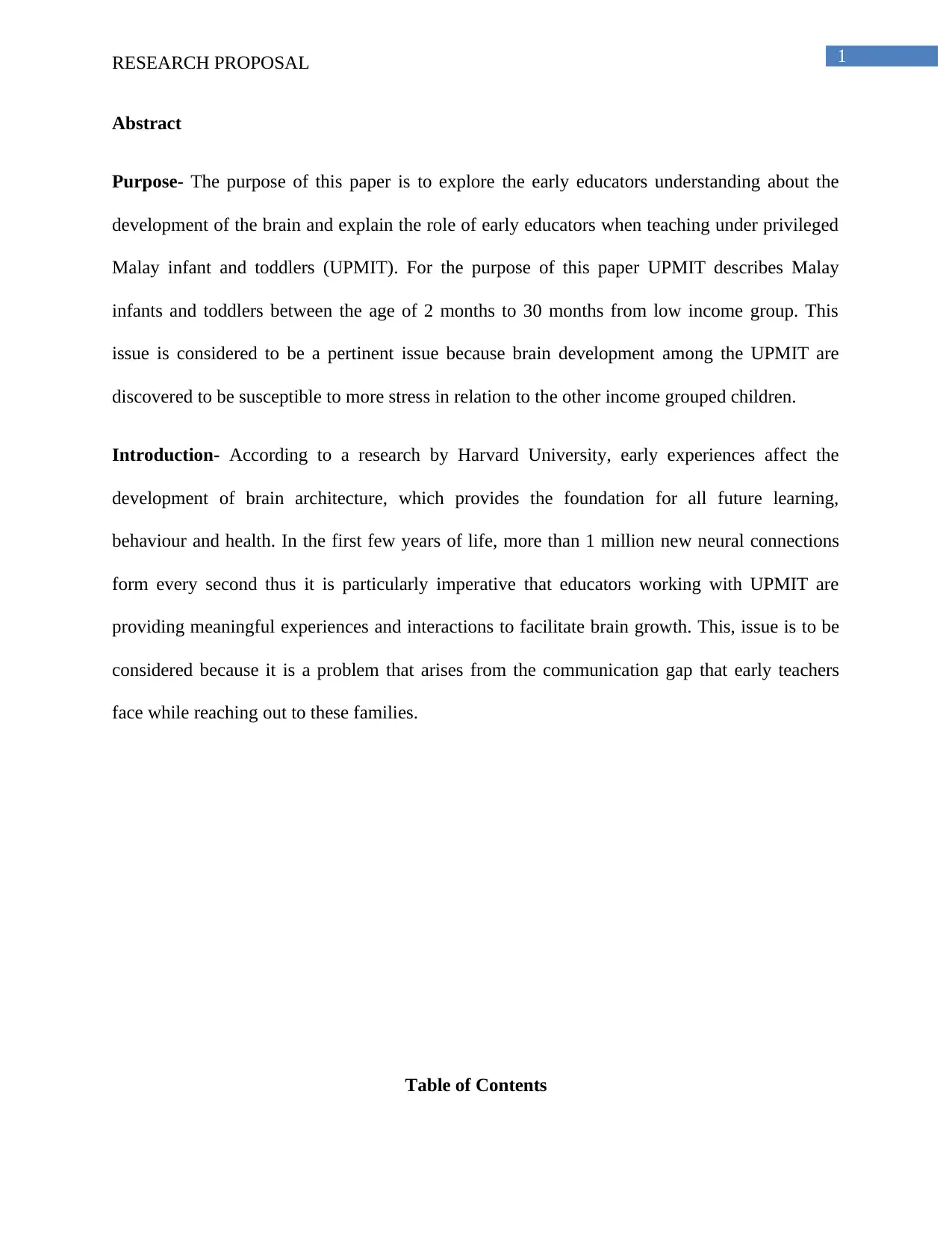
1RESEARCH PROPOSAL
Abstract
Purpose- The purpose of this paper is to explore the early educators understanding about the
development of the brain and explain the role of early educators when teaching under privileged
Malay infant and toddlers (UPMIT). For the purpose of this paper UPMIT describes Malay
infants and toddlers between the age of 2 months to 30 months from low income group. This
issue is considered to be a pertinent issue because brain development among the UPMIT are
discovered to be susceptible to more stress in relation to the other income grouped children.
Introduction- According to a research by Harvard University, early experiences affect the
development of brain architecture, which provides the foundation for all future learning,
behaviour and health. In the first few years of life, more than 1 million new neural connections
form every second thus it is particularly imperative that educators working with UPMIT are
providing meaningful experiences and interactions to facilitate brain growth. This, issue is to be
considered because it is a problem that arises from the communication gap that early teachers
face while reaching out to these families.
Table of Contents
Abstract
Purpose- The purpose of this paper is to explore the early educators understanding about the
development of the brain and explain the role of early educators when teaching under privileged
Malay infant and toddlers (UPMIT). For the purpose of this paper UPMIT describes Malay
infants and toddlers between the age of 2 months to 30 months from low income group. This
issue is considered to be a pertinent issue because brain development among the UPMIT are
discovered to be susceptible to more stress in relation to the other income grouped children.
Introduction- According to a research by Harvard University, early experiences affect the
development of brain architecture, which provides the foundation for all future learning,
behaviour and health. In the first few years of life, more than 1 million new neural connections
form every second thus it is particularly imperative that educators working with UPMIT are
providing meaningful experiences and interactions to facilitate brain growth. This, issue is to be
considered because it is a problem that arises from the communication gap that early teachers
face while reaching out to these families.
Table of Contents
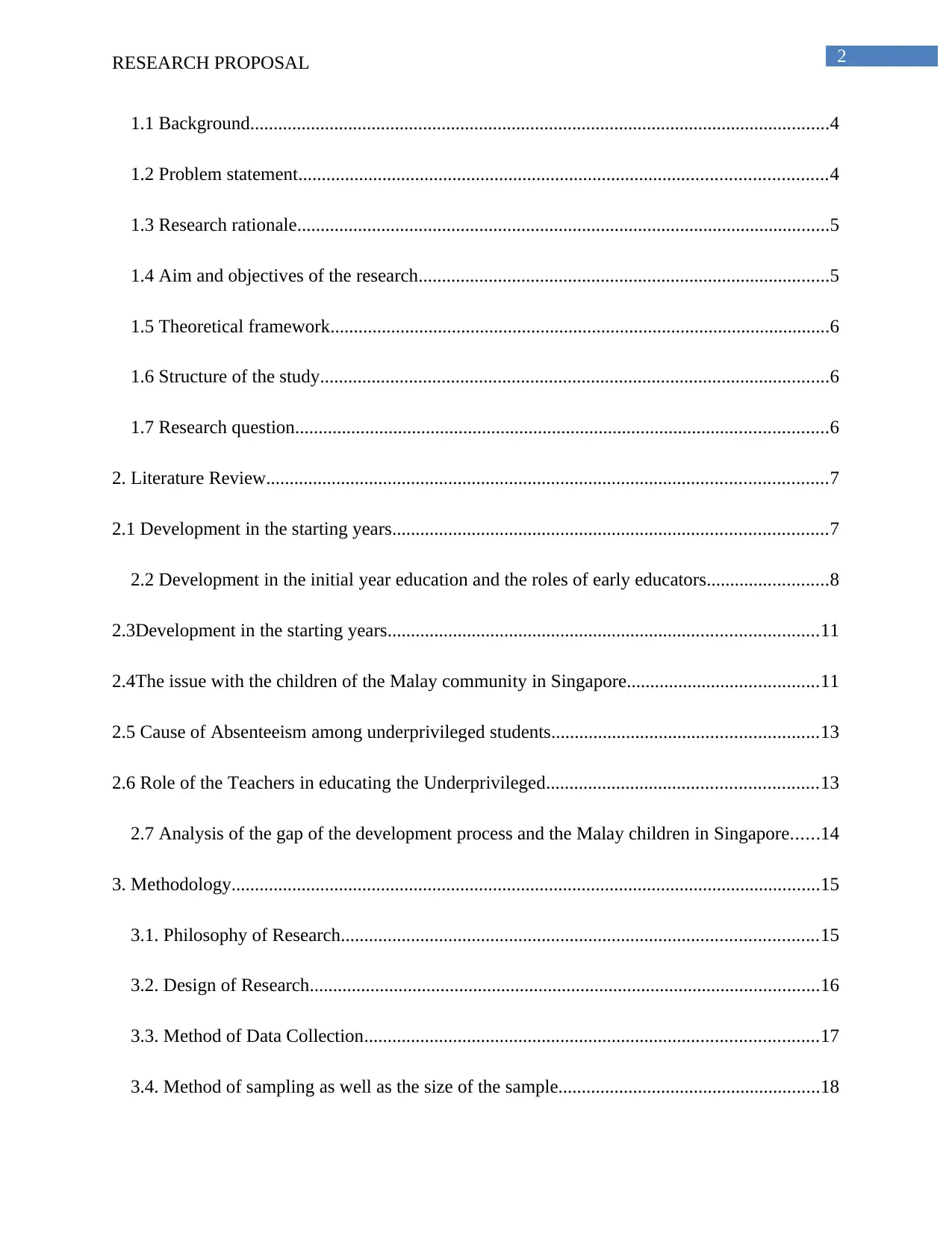
2RESEARCH PROPOSAL
1.1 Background............................................................................................................................4
1.2 Problem statement.................................................................................................................4
1.3 Research rationale..................................................................................................................5
1.4 Aim and objectives of the research........................................................................................5
1.5 Theoretical framework...........................................................................................................6
1.6 Structure of the study.............................................................................................................6
1.7 Research question..................................................................................................................6
2. Literature Review........................................................................................................................7
2.1 Development in the starting years.............................................................................................7
2.2 Development in the initial year education and the roles of early educators..........................8
2.3Development in the starting years............................................................................................11
2.4The issue with the children of the Malay community in Singapore.........................................11
2.5 Cause of Absenteeism among underprivileged students.........................................................13
2.6 Role of the Teachers in educating the Underprivileged..........................................................13
2.7 Analysis of the gap of the development process and the Malay children in Singapore......14
3. Methodology..............................................................................................................................15
3.1. Philosophy of Research......................................................................................................15
3.2. Design of Research.............................................................................................................16
3.3. Method of Data Collection.................................................................................................17
3.4. Method of sampling as well as the size of the sample........................................................18
1.1 Background............................................................................................................................4
1.2 Problem statement.................................................................................................................4
1.3 Research rationale..................................................................................................................5
1.4 Aim and objectives of the research........................................................................................5
1.5 Theoretical framework...........................................................................................................6
1.6 Structure of the study.............................................................................................................6
1.7 Research question..................................................................................................................6
2. Literature Review........................................................................................................................7
2.1 Development in the starting years.............................................................................................7
2.2 Development in the initial year education and the roles of early educators..........................8
2.3Development in the starting years............................................................................................11
2.4The issue with the children of the Malay community in Singapore.........................................11
2.5 Cause of Absenteeism among underprivileged students.........................................................13
2.6 Role of the Teachers in educating the Underprivileged..........................................................13
2.7 Analysis of the gap of the development process and the Malay children in Singapore......14
3. Methodology..............................................................................................................................15
3.1. Philosophy of Research......................................................................................................15
3.2. Design of Research.............................................................................................................16
3.3. Method of Data Collection.................................................................................................17
3.4. Method of sampling as well as the size of the sample........................................................18
⊘ This is a preview!⊘
Do you want full access?
Subscribe today to unlock all pages.

Trusted by 1+ million students worldwide
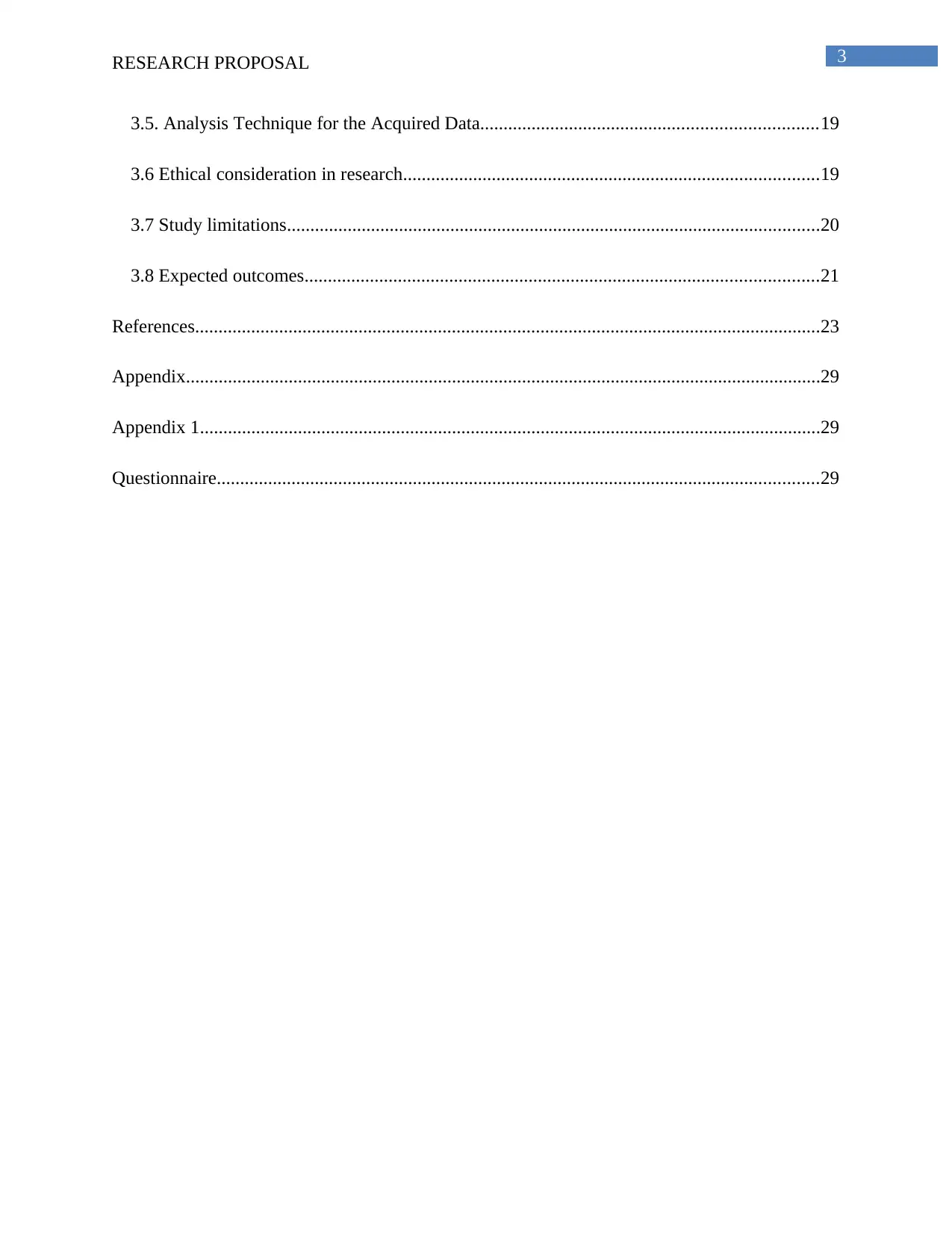
3RESEARCH PROPOSAL
3.5. Analysis Technique for the Acquired Data........................................................................19
3.6 Ethical consideration in research.........................................................................................19
3.7 Study limitations..................................................................................................................20
3.8 Expected outcomes..............................................................................................................21
References......................................................................................................................................23
Appendix........................................................................................................................................29
Appendix 1.....................................................................................................................................29
Questionnaire.................................................................................................................................29
3.5. Analysis Technique for the Acquired Data........................................................................19
3.6 Ethical consideration in research.........................................................................................19
3.7 Study limitations..................................................................................................................20
3.8 Expected outcomes..............................................................................................................21
References......................................................................................................................................23
Appendix........................................................................................................................................29
Appendix 1.....................................................................................................................................29
Questionnaire.................................................................................................................................29
Paraphrase This Document
Need a fresh take? Get an instant paraphrase of this document with our AI Paraphraser
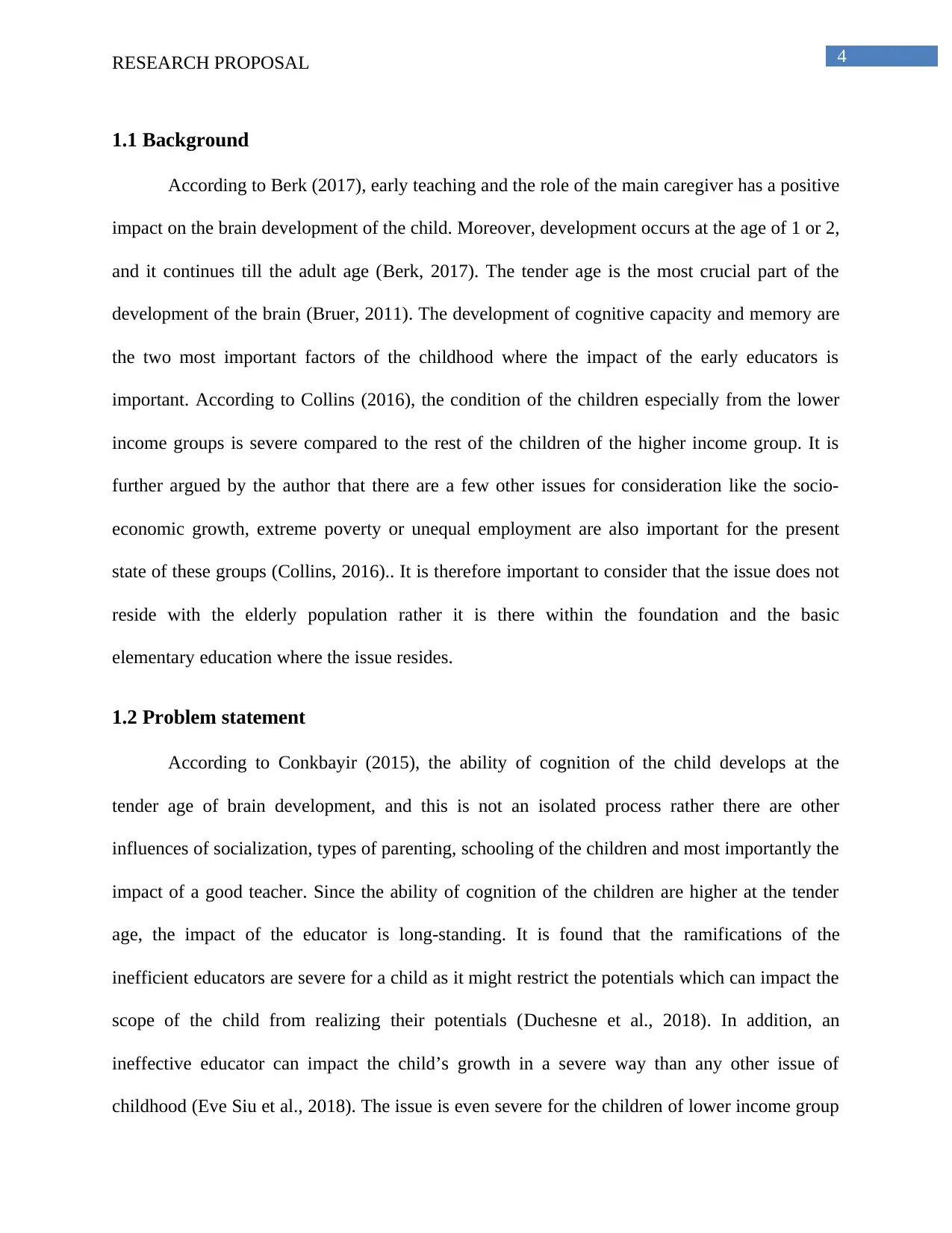
4RESEARCH PROPOSAL
1.1 Background
According to Berk (2017), early teaching and the role of the main caregiver has a positive
impact on the brain development of the child. Moreover, development occurs at the age of 1 or 2,
and it continues till the adult age (Berk, 2017). The tender age is the most crucial part of the
development of the brain (Bruer, 2011). The development of cognitive capacity and memory are
the two most important factors of the childhood where the impact of the early educators is
important. According to Collins (2016), the condition of the children especially from the lower
income groups is severe compared to the rest of the children of the higher income group. It is
further argued by the author that there are a few other issues for consideration like the socio-
economic growth, extreme poverty or unequal employment are also important for the present
state of these groups (Collins, 2016).. It is therefore important to consider that the issue does not
reside with the elderly population rather it is there within the foundation and the basic
elementary education where the issue resides.
1.2 Problem statement
According to Conkbayir (2015), the ability of cognition of the child develops at the
tender age of brain development, and this is not an isolated process rather there are other
influences of socialization, types of parenting, schooling of the children and most importantly the
impact of a good teacher. Since the ability of cognition of the children are higher at the tender
age, the impact of the educator is long-standing. It is found that the ramifications of the
inefficient educators are severe for a child as it might restrict the potentials which can impact the
scope of the child from realizing their potentials (Duchesne et al., 2018). In addition, an
ineffective educator can impact the child’s growth in a severe way than any other issue of
childhood (Eve Siu et al., 2018). The issue is even severe for the children of lower income group
1.1 Background
According to Berk (2017), early teaching and the role of the main caregiver has a positive
impact on the brain development of the child. Moreover, development occurs at the age of 1 or 2,
and it continues till the adult age (Berk, 2017). The tender age is the most crucial part of the
development of the brain (Bruer, 2011). The development of cognitive capacity and memory are
the two most important factors of the childhood where the impact of the early educators is
important. According to Collins (2016), the condition of the children especially from the lower
income groups is severe compared to the rest of the children of the higher income group. It is
further argued by the author that there are a few other issues for consideration like the socio-
economic growth, extreme poverty or unequal employment are also important for the present
state of these groups (Collins, 2016).. It is therefore important to consider that the issue does not
reside with the elderly population rather it is there within the foundation and the basic
elementary education where the issue resides.
1.2 Problem statement
According to Conkbayir (2015), the ability of cognition of the child develops at the
tender age of brain development, and this is not an isolated process rather there are other
influences of socialization, types of parenting, schooling of the children and most importantly the
impact of a good teacher. Since the ability of cognition of the children are higher at the tender
age, the impact of the educator is long-standing. It is found that the ramifications of the
inefficient educators are severe for a child as it might restrict the potentials which can impact the
scope of the child from realizing their potentials (Duchesne et al., 2018). In addition, an
ineffective educator can impact the child’s growth in a severe way than any other issue of
childhood (Eve Siu et al., 2018). The issue is even severe for the children of lower income group
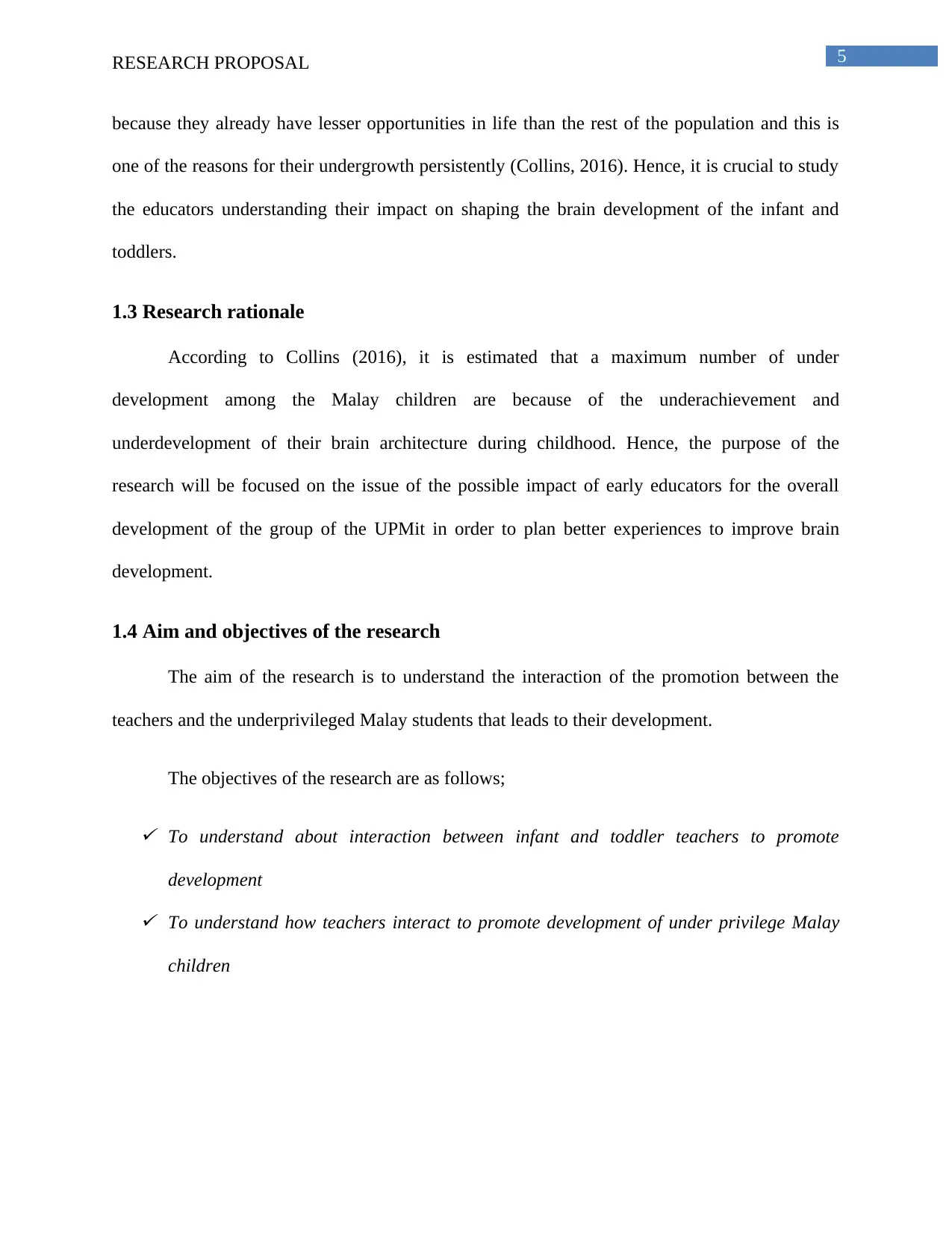
5RESEARCH PROPOSAL
because they already have lesser opportunities in life than the rest of the population and this is
one of the reasons for their undergrowth persistently (Collins, 2016). Hence, it is crucial to study
the educators understanding their impact on shaping the brain development of the infant and
toddlers.
1.3 Research rationale
According to Collins (2016), it is estimated that a maximum number of under
development among the Malay children are because of the underachievement and
underdevelopment of their brain architecture during childhood. Hence, the purpose of the
research will be focused on the issue of the possible impact of early educators for the overall
development of the group of the UPMit in order to plan better experiences to improve brain
development.
1.4 Aim and objectives of the research
The aim of the research is to understand the interaction of the promotion between the
teachers and the underprivileged Malay students that leads to their development.
The objectives of the research are as follows;
To understand about interaction between infant and toddler teachers to promote
development To understand how teachers interact to promote development of under privilege Malay
children
because they already have lesser opportunities in life than the rest of the population and this is
one of the reasons for their undergrowth persistently (Collins, 2016). Hence, it is crucial to study
the educators understanding their impact on shaping the brain development of the infant and
toddlers.
1.3 Research rationale
According to Collins (2016), it is estimated that a maximum number of under
development among the Malay children are because of the underachievement and
underdevelopment of their brain architecture during childhood. Hence, the purpose of the
research will be focused on the issue of the possible impact of early educators for the overall
development of the group of the UPMit in order to plan better experiences to improve brain
development.
1.4 Aim and objectives of the research
The aim of the research is to understand the interaction of the promotion between the
teachers and the underprivileged Malay students that leads to their development.
The objectives of the research are as follows;
To understand about interaction between infant and toddler teachers to promote
development To understand how teachers interact to promote development of under privilege Malay
children
⊘ This is a preview!⊘
Do you want full access?
Subscribe today to unlock all pages.

Trusted by 1+ million students worldwide
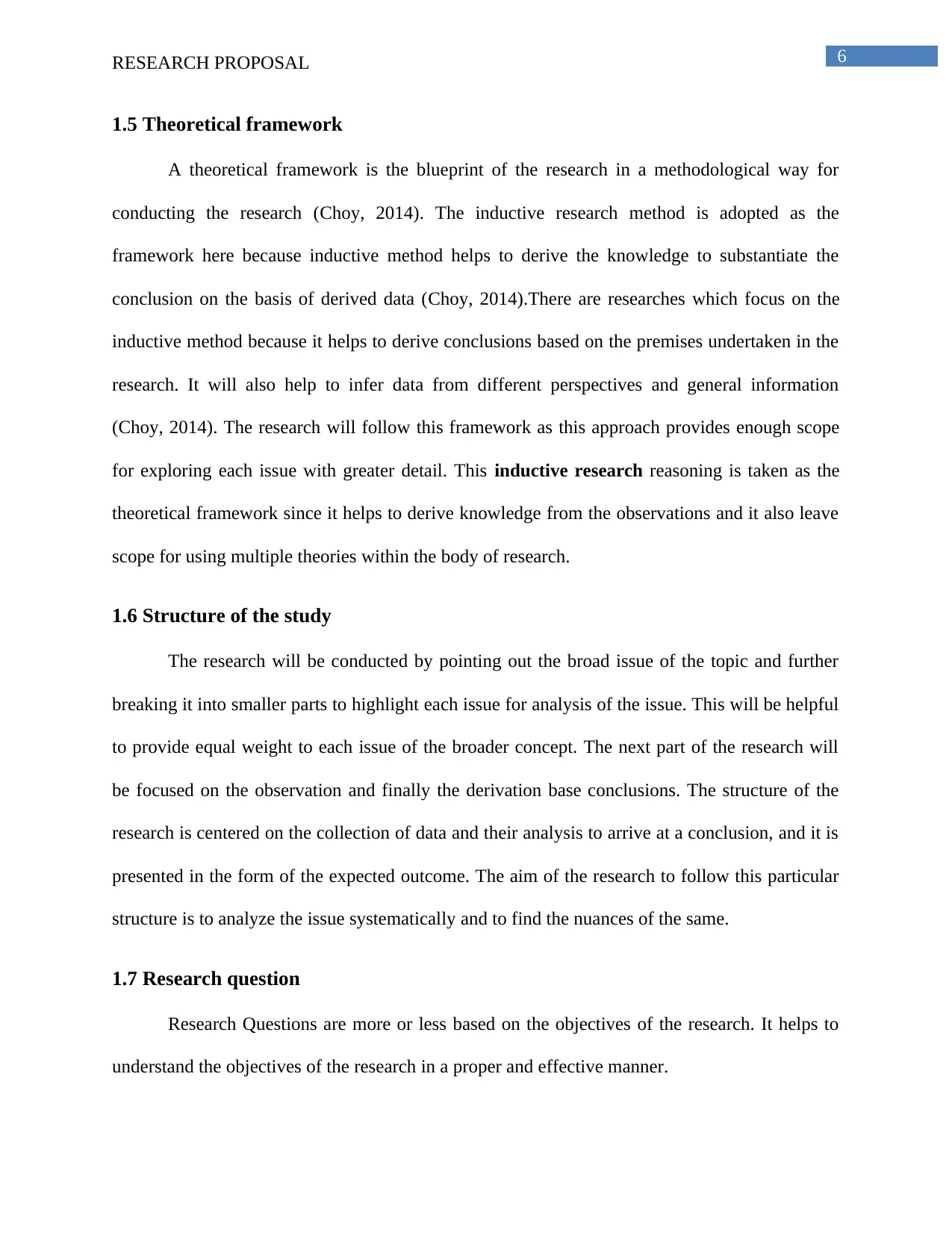
6RESEARCH PROPOSAL
1.5 Theoretical framework
A theoretical framework is the blueprint of the research in a methodological way for
conducting the research (Choy, 2014). The inductive research method is adopted as the
framework here because inductive method helps to derive the knowledge to substantiate the
conclusion on the basis of derived data (Choy, 2014).There are researches which focus on the
inductive method because it helps to derive conclusions based on the premises undertaken in the
research. It will also help to infer data from different perspectives and general information
(Choy, 2014). The research will follow this framework as this approach provides enough scope
for exploring each issue with greater detail. This inductive research reasoning is taken as the
theoretical framework since it helps to derive knowledge from the observations and it also leave
scope for using multiple theories within the body of research.
1.6 Structure of the study
The research will be conducted by pointing out the broad issue of the topic and further
breaking it into smaller parts to highlight each issue for analysis of the issue. This will be helpful
to provide equal weight to each issue of the broader concept. The next part of the research will
be focused on the observation and finally the derivation base conclusions. The structure of the
research is centered on the collection of data and their analysis to arrive at a conclusion, and it is
presented in the form of the expected outcome. The aim of the research to follow this particular
structure is to analyze the issue systematically and to find the nuances of the same.
1.7 Research question
Research Questions are more or less based on the objectives of the research. It helps to
understand the objectives of the research in a proper and effective manner.
1.5 Theoretical framework
A theoretical framework is the blueprint of the research in a methodological way for
conducting the research (Choy, 2014). The inductive research method is adopted as the
framework here because inductive method helps to derive the knowledge to substantiate the
conclusion on the basis of derived data (Choy, 2014).There are researches which focus on the
inductive method because it helps to derive conclusions based on the premises undertaken in the
research. It will also help to infer data from different perspectives and general information
(Choy, 2014). The research will follow this framework as this approach provides enough scope
for exploring each issue with greater detail. This inductive research reasoning is taken as the
theoretical framework since it helps to derive knowledge from the observations and it also leave
scope for using multiple theories within the body of research.
1.6 Structure of the study
The research will be conducted by pointing out the broad issue of the topic and further
breaking it into smaller parts to highlight each issue for analysis of the issue. This will be helpful
to provide equal weight to each issue of the broader concept. The next part of the research will
be focused on the observation and finally the derivation base conclusions. The structure of the
research is centered on the collection of data and their analysis to arrive at a conclusion, and it is
presented in the form of the expected outcome. The aim of the research to follow this particular
structure is to analyze the issue systematically and to find the nuances of the same.
1.7 Research question
Research Questions are more or less based on the objectives of the research. It helps to
understand the objectives of the research in a proper and effective manner.
Paraphrase This Document
Need a fresh take? Get an instant paraphrase of this document with our AI Paraphraser
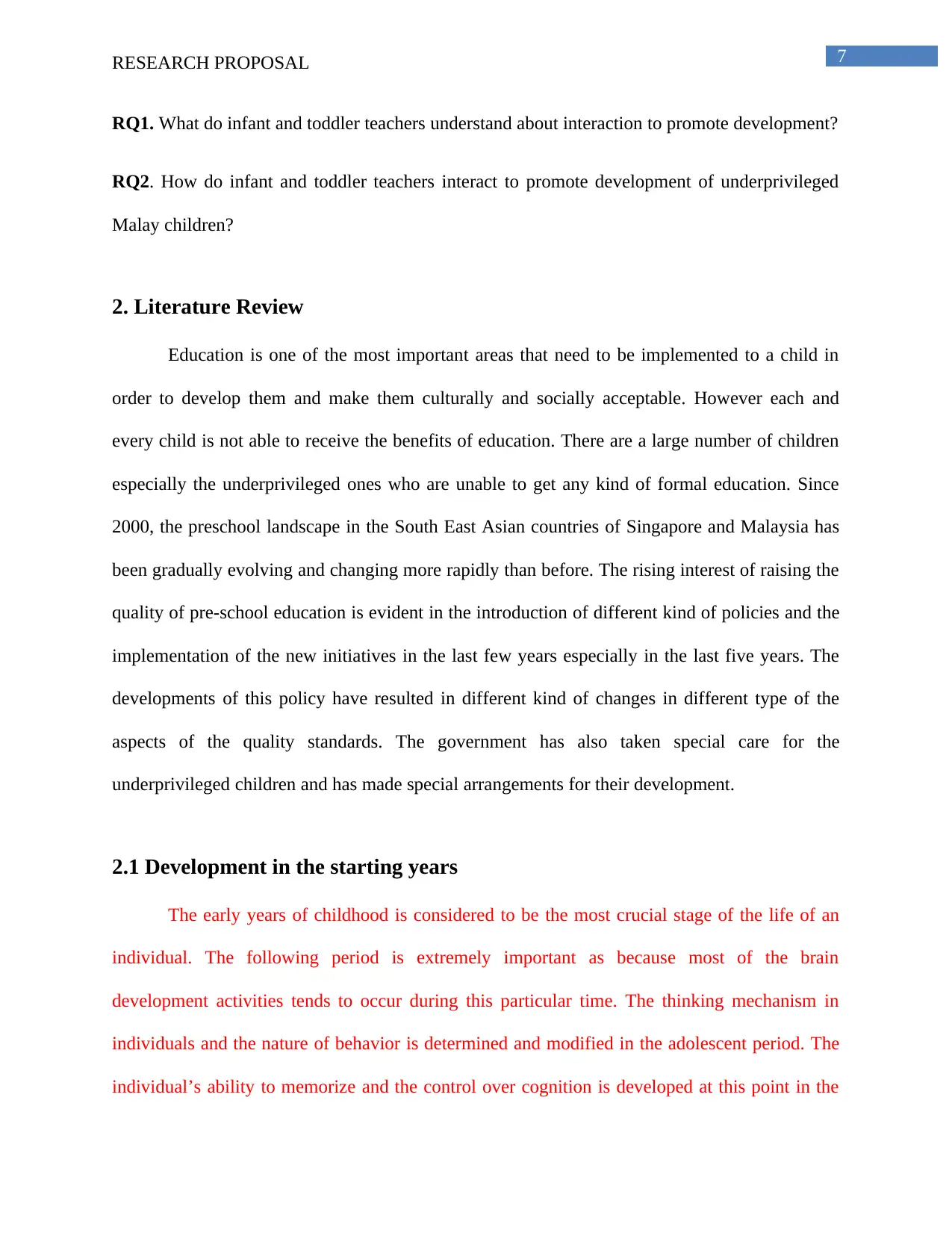
7RESEARCH PROPOSAL
RQ1. What do infant and toddler teachers understand about interaction to promote development?
RQ2. How do infant and toddler teachers interact to promote development of underprivileged
Malay children?
2. Literature Review
Education is one of the most important areas that need to be implemented to a child in
order to develop them and make them culturally and socially acceptable. However each and
every child is not able to receive the benefits of education. There are a large number of children
especially the underprivileged ones who are unable to get any kind of formal education. Since
2000, the preschool landscape in the South East Asian countries of Singapore and Malaysia has
been gradually evolving and changing more rapidly than before. The rising interest of raising the
quality of pre-school education is evident in the introduction of different kind of policies and the
implementation of the new initiatives in the last few years especially in the last five years. The
developments of this policy have resulted in different kind of changes in different type of the
aspects of the quality standards. The government has also taken special care for the
underprivileged children and has made special arrangements for their development.
2.1 Development in the starting years
The early years of childhood is considered to be the most crucial stage of the life of an
individual. The following period is extremely important as because most of the brain
development activities tends to occur during this particular time. The thinking mechanism in
individuals and the nature of behavior is determined and modified in the adolescent period. The
individual’s ability to memorize and the control over cognition is developed at this point in the
RQ1. What do infant and toddler teachers understand about interaction to promote development?
RQ2. How do infant and toddler teachers interact to promote development of underprivileged
Malay children?
2. Literature Review
Education is one of the most important areas that need to be implemented to a child in
order to develop them and make them culturally and socially acceptable. However each and
every child is not able to receive the benefits of education. There are a large number of children
especially the underprivileged ones who are unable to get any kind of formal education. Since
2000, the preschool landscape in the South East Asian countries of Singapore and Malaysia has
been gradually evolving and changing more rapidly than before. The rising interest of raising the
quality of pre-school education is evident in the introduction of different kind of policies and the
implementation of the new initiatives in the last few years especially in the last five years. The
developments of this policy have resulted in different kind of changes in different type of the
aspects of the quality standards. The government has also taken special care for the
underprivileged children and has made special arrangements for their development.
2.1 Development in the starting years
The early years of childhood is considered to be the most crucial stage of the life of an
individual. The following period is extremely important as because most of the brain
development activities tends to occur during this particular time. The thinking mechanism in
individuals and the nature of behavior is determined and modified in the adolescent period. The
individual’s ability to memorize and the control over cognition is developed at this point in the
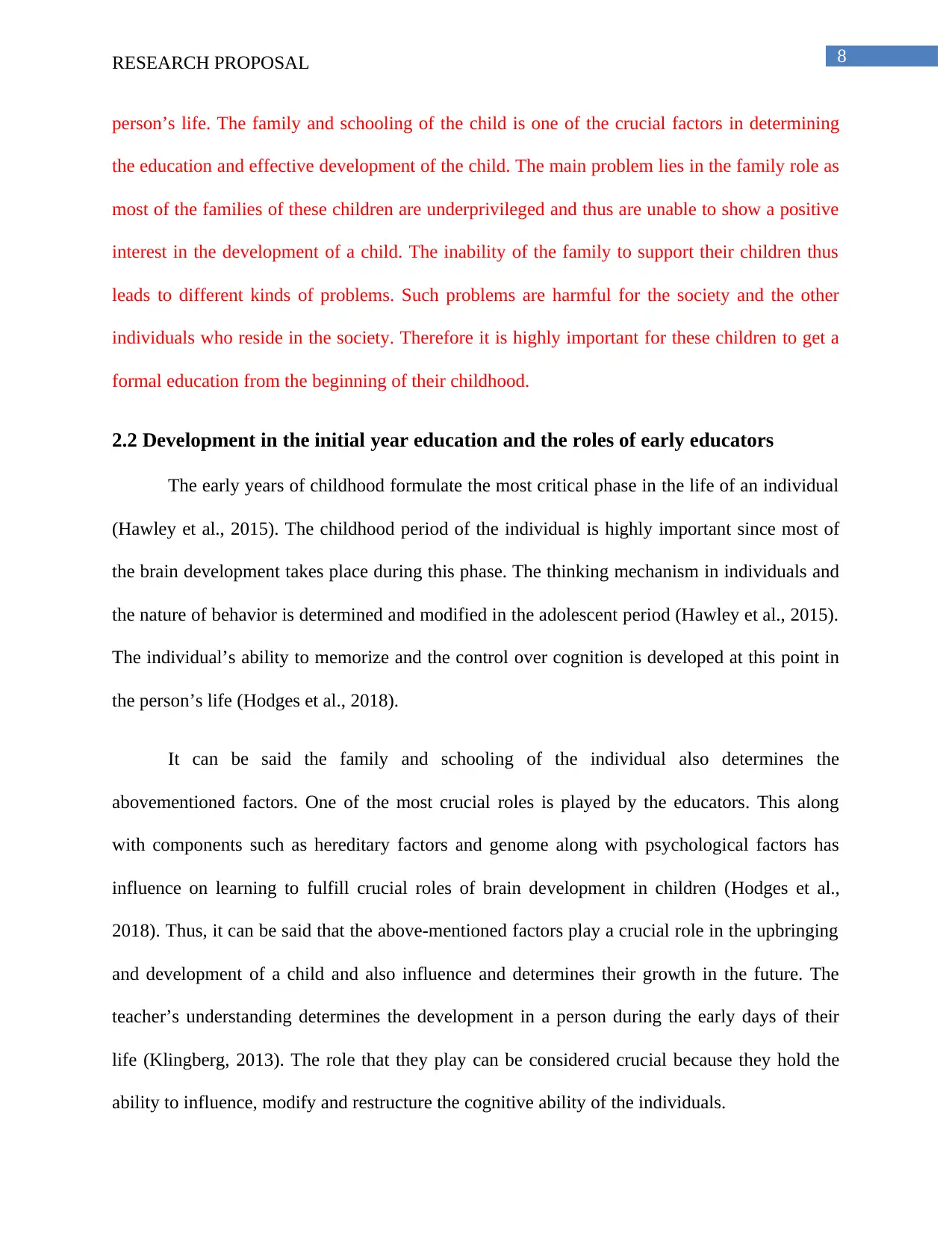
8RESEARCH PROPOSAL
person’s life. The family and schooling of the child is one of the crucial factors in determining
the education and effective development of the child. The main problem lies in the family role as
most of the families of these children are underprivileged and thus are unable to show a positive
interest in the development of a child. The inability of the family to support their children thus
leads to different kinds of problems. Such problems are harmful for the society and the other
individuals who reside in the society. Therefore it is highly important for these children to get a
formal education from the beginning of their childhood.
2.2 Development in the initial year education and the roles of early educators
The early years of childhood formulate the most critical phase in the life of an individual
(Hawley et al., 2015). The childhood period of the individual is highly important since most of
the brain development takes place during this phase. The thinking mechanism in individuals and
the nature of behavior is determined and modified in the adolescent period (Hawley et al., 2015).
The individual’s ability to memorize and the control over cognition is developed at this point in
the person’s life (Hodges et al., 2018).
It can be said the family and schooling of the individual also determines the
abovementioned factors. One of the most crucial roles is played by the educators. This along
with components such as hereditary factors and genome along with psychological factors has
influence on learning to fulfill crucial roles of brain development in children (Hodges et al.,
2018). Thus, it can be said that the above-mentioned factors play a crucial role in the upbringing
and development of a child and also influence and determines their growth in the future. The
teacher’s understanding determines the development in a person during the early days of their
life (Klingberg, 2013). The role that they play can be considered crucial because they hold the
ability to influence, modify and restructure the cognitive ability of the individuals.
person’s life. The family and schooling of the child is one of the crucial factors in determining
the education and effective development of the child. The main problem lies in the family role as
most of the families of these children are underprivileged and thus are unable to show a positive
interest in the development of a child. The inability of the family to support their children thus
leads to different kinds of problems. Such problems are harmful for the society and the other
individuals who reside in the society. Therefore it is highly important for these children to get a
formal education from the beginning of their childhood.
2.2 Development in the initial year education and the roles of early educators
The early years of childhood formulate the most critical phase in the life of an individual
(Hawley et al., 2015). The childhood period of the individual is highly important since most of
the brain development takes place during this phase. The thinking mechanism in individuals and
the nature of behavior is determined and modified in the adolescent period (Hawley et al., 2015).
The individual’s ability to memorize and the control over cognition is developed at this point in
the person’s life (Hodges et al., 2018).
It can be said the family and schooling of the individual also determines the
abovementioned factors. One of the most crucial roles is played by the educators. This along
with components such as hereditary factors and genome along with psychological factors has
influence on learning to fulfill crucial roles of brain development in children (Hodges et al.,
2018). Thus, it can be said that the above-mentioned factors play a crucial role in the upbringing
and development of a child and also influence and determines their growth in the future. The
teacher’s understanding determines the development in a person during the early days of their
life (Klingberg, 2013). The role that they play can be considered crucial because they hold the
ability to influence, modify and restructure the cognitive ability of the individuals.
⊘ This is a preview!⊘
Do you want full access?
Subscribe today to unlock all pages.

Trusted by 1+ million students worldwide
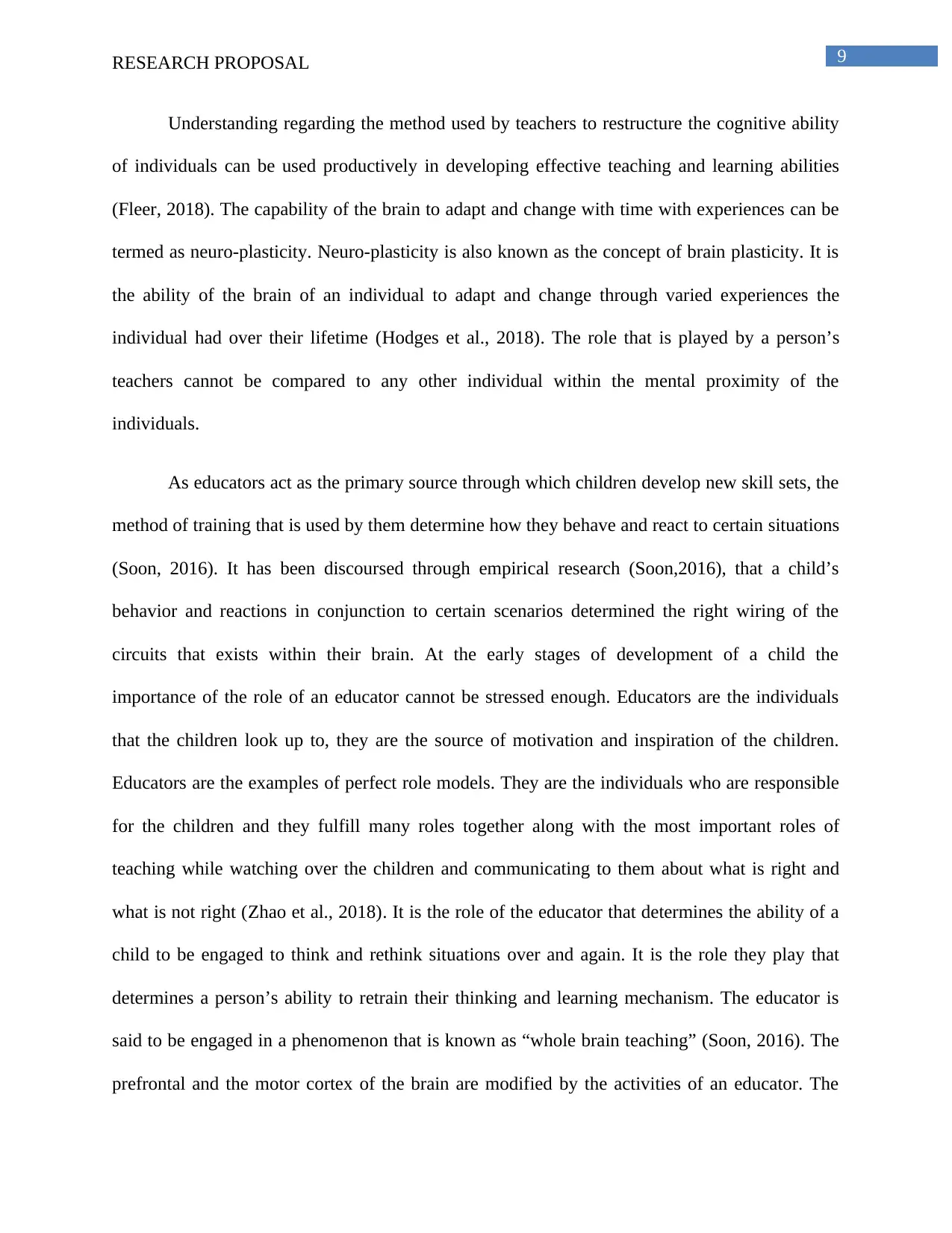
9RESEARCH PROPOSAL
Understanding regarding the method used by teachers to restructure the cognitive ability
of individuals can be used productively in developing effective teaching and learning abilities
(Fleer, 2018). The capability of the brain to adapt and change with time with experiences can be
termed as neuro-plasticity. Neuro-plasticity is also known as the concept of brain plasticity. It is
the ability of the brain of an individual to adapt and change through varied experiences the
individual had over their lifetime (Hodges et al., 2018). The role that is played by a person’s
teachers cannot be compared to any other individual within the mental proximity of the
individuals.
As educators act as the primary source through which children develop new skill sets, the
method of training that is used by them determine how they behave and react to certain situations
(Soon, 2016). It has been discoursed through empirical research (Soon,2016), that a child’s
behavior and reactions in conjunction to certain scenarios determined the right wiring of the
circuits that exists within their brain. At the early stages of development of a child the
importance of the role of an educator cannot be stressed enough. Educators are the individuals
that the children look up to, they are the source of motivation and inspiration of the children.
Educators are the examples of perfect role models. They are the individuals who are responsible
for the children and they fulfill many roles together along with the most important roles of
teaching while watching over the children and communicating to them about what is right and
what is not right (Zhao et al., 2018). It is the role of the educator that determines the ability of a
child to be engaged to think and rethink situations over and again. It is the role they play that
determines a person’s ability to retrain their thinking and learning mechanism. The educator is
said to be engaged in a phenomenon that is known as “whole brain teaching” (Soon, 2016). The
prefrontal and the motor cortex of the brain are modified by the activities of an educator. The
Understanding regarding the method used by teachers to restructure the cognitive ability
of individuals can be used productively in developing effective teaching and learning abilities
(Fleer, 2018). The capability of the brain to adapt and change with time with experiences can be
termed as neuro-plasticity. Neuro-plasticity is also known as the concept of brain plasticity. It is
the ability of the brain of an individual to adapt and change through varied experiences the
individual had over their lifetime (Hodges et al., 2018). The role that is played by a person’s
teachers cannot be compared to any other individual within the mental proximity of the
individuals.
As educators act as the primary source through which children develop new skill sets, the
method of training that is used by them determine how they behave and react to certain situations
(Soon, 2016). It has been discoursed through empirical research (Soon,2016), that a child’s
behavior and reactions in conjunction to certain scenarios determined the right wiring of the
circuits that exists within their brain. At the early stages of development of a child the
importance of the role of an educator cannot be stressed enough. Educators are the individuals
that the children look up to, they are the source of motivation and inspiration of the children.
Educators are the examples of perfect role models. They are the individuals who are responsible
for the children and they fulfill many roles together along with the most important roles of
teaching while watching over the children and communicating to them about what is right and
what is not right (Zhao et al., 2018). It is the role of the educator that determines the ability of a
child to be engaged to think and rethink situations over and again. It is the role they play that
determines a person’s ability to retrain their thinking and learning mechanism. The educator is
said to be engaged in a phenomenon that is known as “whole brain teaching” (Soon, 2016). The
prefrontal and the motor cortex of the brain are modified by the activities of an educator. The
Paraphrase This Document
Need a fresh take? Get an instant paraphrase of this document with our AI Paraphraser
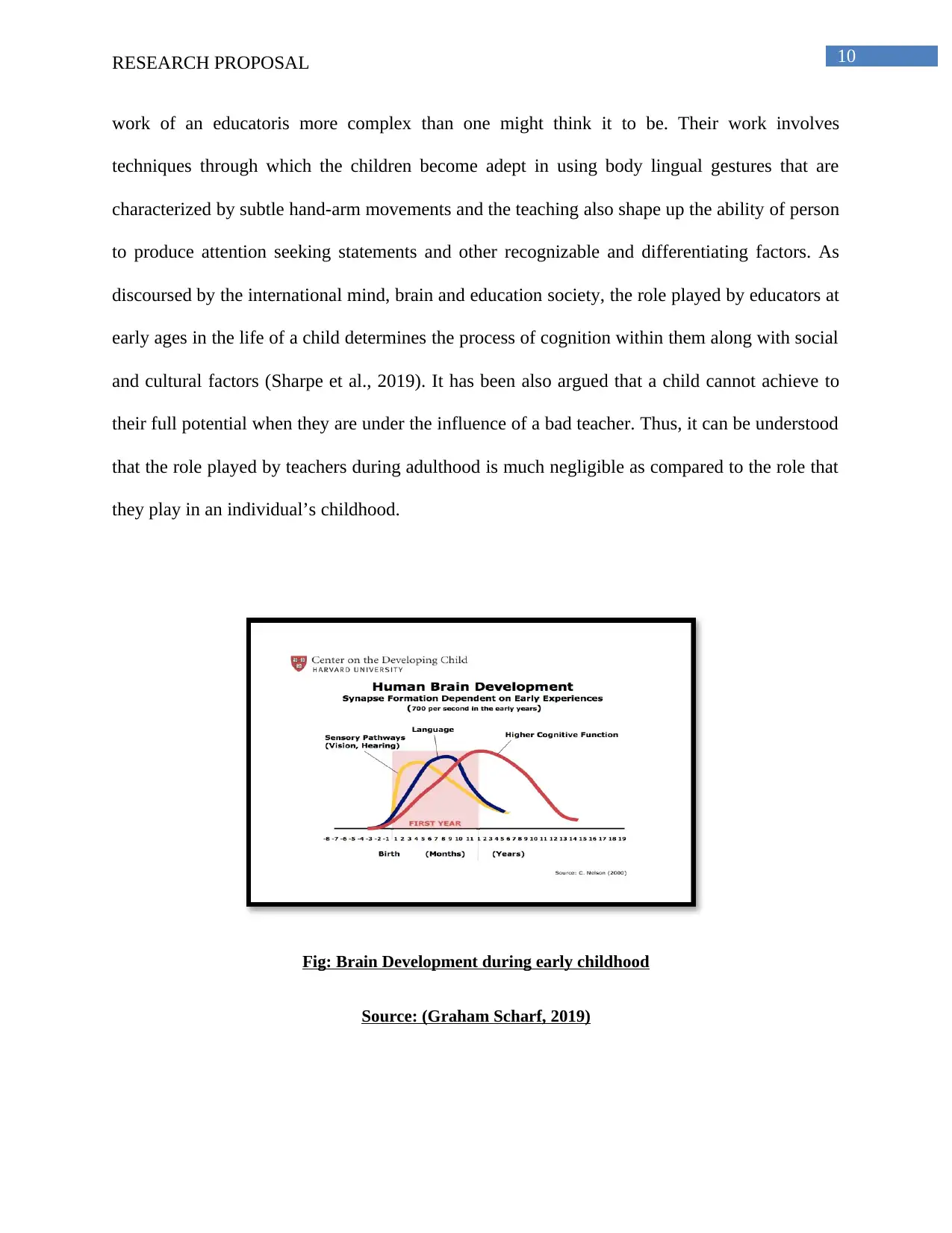
10RESEARCH PROPOSAL
work of an educatoris more complex than one might think it to be. Their work involves
techniques through which the children become adept in using body lingual gestures that are
characterized by subtle hand-arm movements and the teaching also shape up the ability of person
to produce attention seeking statements and other recognizable and differentiating factors. As
discoursed by the international mind, brain and education society, the role played by educators at
early ages in the life of a child determines the process of cognition within them along with social
and cultural factors (Sharpe et al., 2019). It has been also argued that a child cannot achieve to
their full potential when they are under the influence of a bad teacher. Thus, it can be understood
that the role played by teachers during adulthood is much negligible as compared to the role that
they play in an individual’s childhood.
Fig: Brain Development during early childhood
Source: (Graham Scharf, 2019)
work of an educatoris more complex than one might think it to be. Their work involves
techniques through which the children become adept in using body lingual gestures that are
characterized by subtle hand-arm movements and the teaching also shape up the ability of person
to produce attention seeking statements and other recognizable and differentiating factors. As
discoursed by the international mind, brain and education society, the role played by educators at
early ages in the life of a child determines the process of cognition within them along with social
and cultural factors (Sharpe et al., 2019). It has been also argued that a child cannot achieve to
their full potential when they are under the influence of a bad teacher. Thus, it can be understood
that the role played by teachers during adulthood is much negligible as compared to the role that
they play in an individual’s childhood.
Fig: Brain Development during early childhood
Source: (Graham Scharf, 2019)
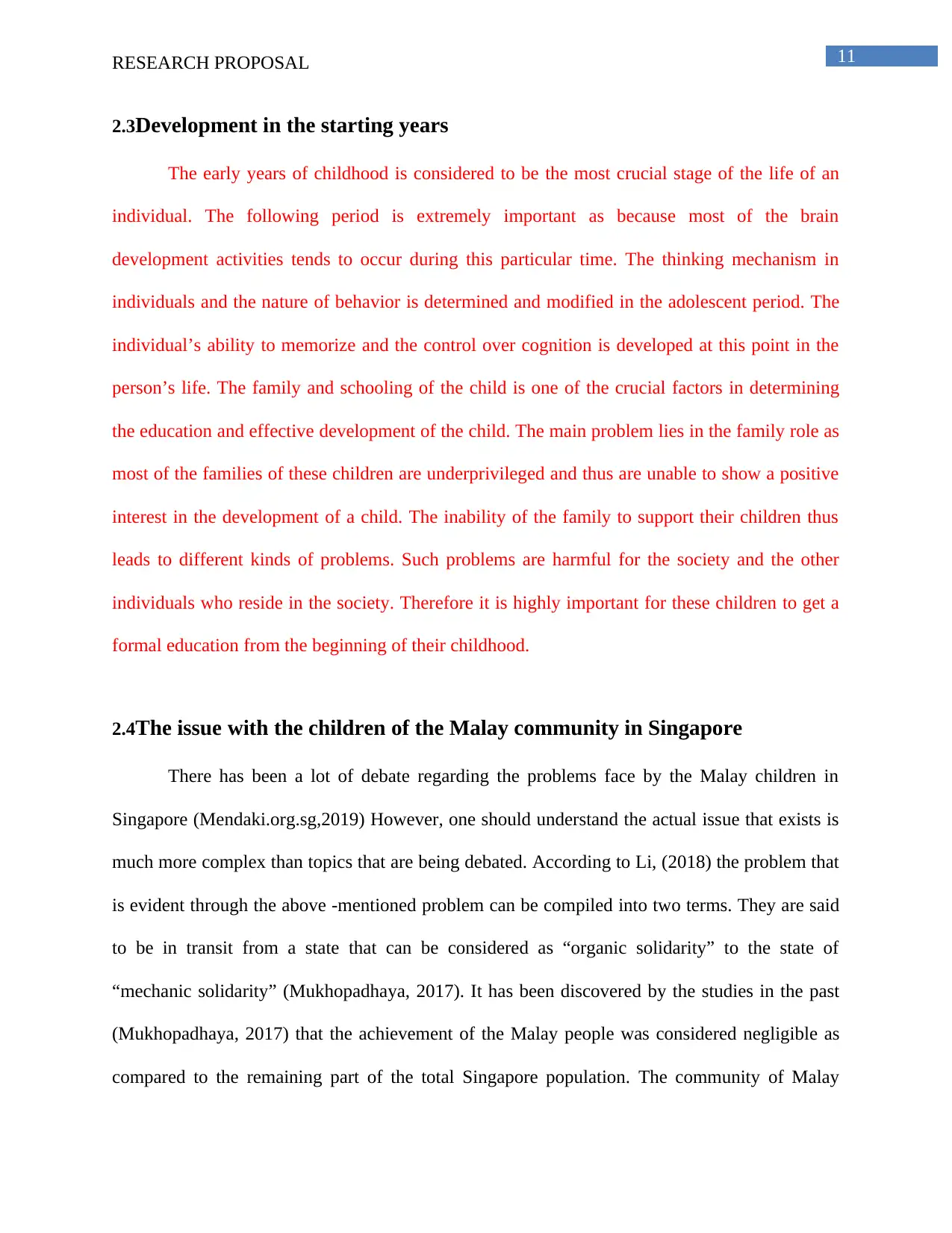
11RESEARCH PROPOSAL
2.3Development in the starting years
The early years of childhood is considered to be the most crucial stage of the life of an
individual. The following period is extremely important as because most of the brain
development activities tends to occur during this particular time. The thinking mechanism in
individuals and the nature of behavior is determined and modified in the adolescent period. The
individual’s ability to memorize and the control over cognition is developed at this point in the
person’s life. The family and schooling of the child is one of the crucial factors in determining
the education and effective development of the child. The main problem lies in the family role as
most of the families of these children are underprivileged and thus are unable to show a positive
interest in the development of a child. The inability of the family to support their children thus
leads to different kinds of problems. Such problems are harmful for the society and the other
individuals who reside in the society. Therefore it is highly important for these children to get a
formal education from the beginning of their childhood.
2.4The issue with the children of the Malay community in Singapore
There has been a lot of debate regarding the problems face by the Malay children in
Singapore (Mendaki.org.sg,2019) However, one should understand the actual issue that exists is
much more complex than topics that are being debated. According to Li, (2018) the problem that
is evident through the above -mentioned problem can be compiled into two terms. They are said
to be in transit from a state that can be considered as “organic solidarity” to the state of
“mechanic solidarity” (Mukhopadhaya, 2017). It has been discovered by the studies in the past
(Mukhopadhaya, 2017) that the achievement of the Malay people was considered negligible as
compared to the remaining part of the total Singapore population. The community of Malay
2.3Development in the starting years
The early years of childhood is considered to be the most crucial stage of the life of an
individual. The following period is extremely important as because most of the brain
development activities tends to occur during this particular time. The thinking mechanism in
individuals and the nature of behavior is determined and modified in the adolescent period. The
individual’s ability to memorize and the control over cognition is developed at this point in the
person’s life. The family and schooling of the child is one of the crucial factors in determining
the education and effective development of the child. The main problem lies in the family role as
most of the families of these children are underprivileged and thus are unable to show a positive
interest in the development of a child. The inability of the family to support their children thus
leads to different kinds of problems. Such problems are harmful for the society and the other
individuals who reside in the society. Therefore it is highly important for these children to get a
formal education from the beginning of their childhood.
2.4The issue with the children of the Malay community in Singapore
There has been a lot of debate regarding the problems face by the Malay children in
Singapore (Mendaki.org.sg,2019) However, one should understand the actual issue that exists is
much more complex than topics that are being debated. According to Li, (2018) the problem that
is evident through the above -mentioned problem can be compiled into two terms. They are said
to be in transit from a state that can be considered as “organic solidarity” to the state of
“mechanic solidarity” (Mukhopadhaya, 2017). It has been discovered by the studies in the past
(Mukhopadhaya, 2017) that the achievement of the Malay people was considered negligible as
compared to the remaining part of the total Singapore population. The community of Malay
⊘ This is a preview!⊘
Do you want full access?
Subscribe today to unlock all pages.

Trusted by 1+ million students worldwide
1 out of 31
Related Documents
Your All-in-One AI-Powered Toolkit for Academic Success.
+13062052269
info@desklib.com
Available 24*7 on WhatsApp / Email
![[object Object]](/_next/static/media/star-bottom.7253800d.svg)
Unlock your academic potential
Copyright © 2020–2026 A2Z Services. All Rights Reserved. Developed and managed by ZUCOL.





